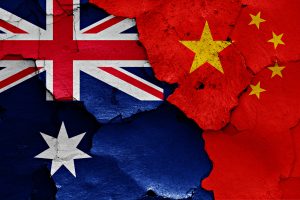The recent visit to Taiwan by Speaker of the U.S. House of Representatives Nancy Pelosi triggered a temperamental reaction from China. Beijing’s subsequent military chest-beating in the waters around Taiwan was designed to demonstrate that it is willing to use its military might to absorb the island. It would have been a comical impulsive flexing of muscles were such an emotive response made by an individual, but it becomes quite serious when such behavior is exhibited by a state of China’s power.
Alongside this display of national machismo there was some curious language that came first from the Chinese embassy in Canberra in an official statement, and subsequently from the Chinese ambassador to Australia, Xiao Qian, in an address to the National Press Club in Canberra this week. The language used can help understand the psychology of the Chinese Communist Party (CCP), and illustrates how there is a perpetual tension between how Australia and China approach the world.
Last week the U.S. secretary of state and the foreign ministers of Australia and Japan released a joint statement that condemned China’s actions in the seas around Taiwan as affecting regional peace and stability. In response, the Chinese embassy in Canberra released a counter-statement claiming that rather than “expressing sympathy and support to the victim,” Australia has instead “condemned the victim.” It is clear the CCP feels Pelosi’s visit was an act of aggression.
China’s sense of victimhood is rooted in the controlling nature of the CCP and the emotional turbulence of its fervent nationalism. There was no physical violence associated with Pelosi’s visit; instead what was hurt was the CCP’s “national sentiments.” Much of the nationalism that the CCP has fermented is built around claiming something that the People’s Republic of China (PRC) has never had – the island of Taiwan. An unwavering assertion that Taiwan is an inalienable part of the PRC’s territory is undermined by the fact that Beijing cannot issue so much as a parking fine on the island.
This is clearly humiliating for the CCP. Yet it is a humiliation it brings upon itself due to its own maximalist desires. The party has sought to create a new state in the PRC by overthrowing a previous order, while simultaneously claiming ownership of the entirety of Chinese culture and history. Taiwan was territory CCP was unable to seize in its revolution, yet its expansive claims also extend to an extraterritorial authority over all ethnic Chinese. Its desires outweigh its capabilities, leading to a constant state of indignation.
Counterintuitively, this is also a humiliation that the CCP is attracted to. The language of humiliation has become very important to Chinese nationalism — a central pillar of which is the “century of humiliation” that China was subjected to by European colonial powers, Russia, and Japan from the mid-19th century through to the mid-20th century. The behavior of these states toward the Chinese people was undeniably negative, yet in order to maintain the emotional pull of this narrative, the humiliation needs to be ongoing. It can’t exist solely in the past.
When Xiao Qian spoke at the National Press Club in Canberra this week he used the language of humiliation to illustrate a point when asked if there could be a future meeting between President Xi Jinping and Australian Prime Minister Anthony Albanese – “If you are talking bad about me, why should I meet you? You humiliated me publicly, should I meet you to be humiliated again face-to-face?” This perspective remains the primary impediment to normalized relations between Australia and China.
There is a perpetual source of tension between China and Australia due to fundamental differences in how each state thinks and feels. Australia is mostly a calm, sober, rational international actor. It is far from perfect, given its treatment of maritime asylum seekers and participation in the U.S. invasion of Iraq, among other things, but it is usually invested in defending the mutually beneficial rules that try to govern the international system.
China, however, is an emotional state, often reacting in ways that are perceived — by the norms of Australian politics — as uncontrolled feelings rather than the result of careful consideration. As an authoritarian state China is inherently suspicious of mutually beneficial rules, believing that they are designed to constrain the hierarchical power it believes is its right. Authoritarianism only sees relationships in terms of dominance and submission: If you are not actively dominating others, you are a victim yourself.
When Australia defends mutually beneficial rules – or the status quo in Taiwan – China takes offense. This is what Xiao considers to be “humiliating.” If China should have the natural authority to act as it pleases, then any statement that highlights the destabilization that would arise from such actions is deemed to be “victimizing” China, despite the overwhelming power discrepancy between the two countries.
For Australia this is a bind. To those who both crave humiliation and seek to humiliate others in response there is a chaos of emotions that makes normal, judicious, diplomatic engagement impossible to conduct. Every action Australia takes in defense of its own national interest, or in support of stability in the Taiwan strait, will always be the wrong one to Beijing.
































